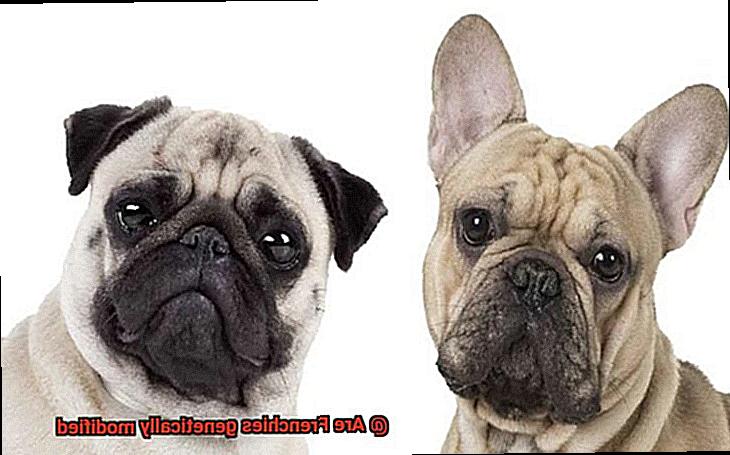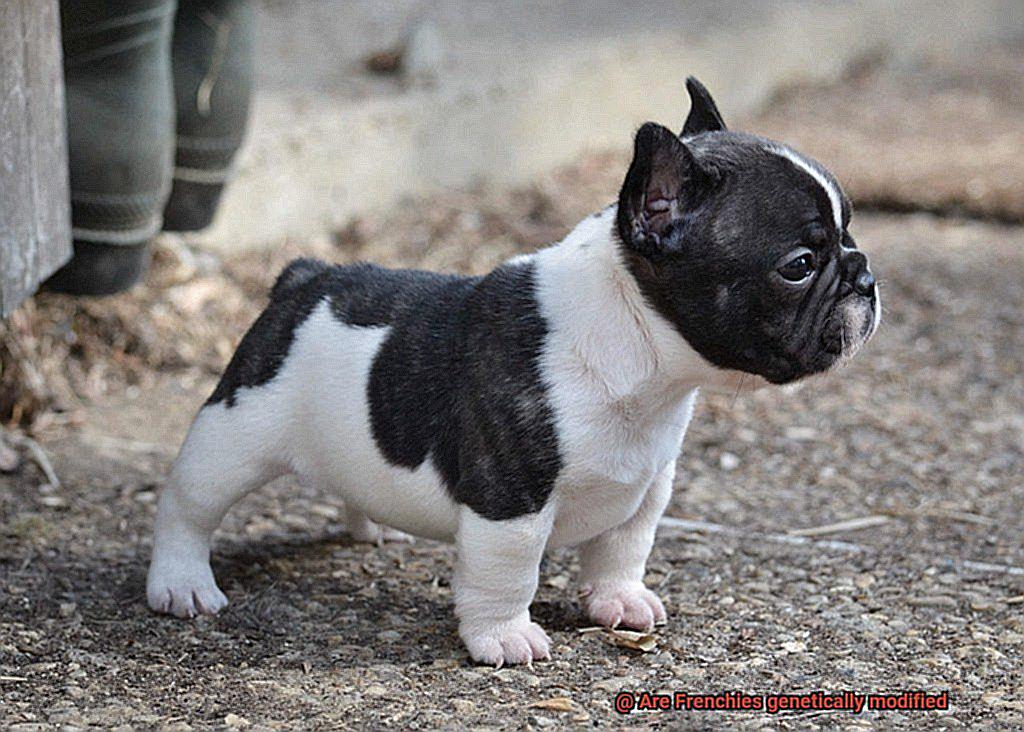Are Frenchies genetically modified?
Get ready to embark on a thrilling adventure through the world where cuteness and science collide – the genetics of French Bulldogs. These little bundles of joy have stolen hearts across the globe with their adorable wrinkles and sheer zest for life. But here’s the burning question: are these Frenchies genetically modified to be so irresistibly charming? Join us as we dig deep into the genes behind our beloved Frenchies and unveil the secrets that make them the delightful companions we can’t get enough of.
French Bulldogs, affectionately known as “Frenchies,” have taken the world by storm in recent years. From social media superstars to lovable sidekicks, these pint-sized pooches have become quite the sensation. However, amidst all the buzz, rumors and misconceptions have sparked curiosity about whether Frenchies are genetically modified. Let’s set the record straight and take a closer look at their genetics.
To truly understand what sets French Bulldogs apart genetically, we need to explore their origins. Believe it or not, these adorable creatures descended from English Bulldogs. During the Industrial Revolution in the late 1800s, English lace workers brought a small group of Bulldogs to France. And that’s where things got interesting – these Bulldogs were crossed with local Terriers, giving birth to our beloved French Bulldog breed.
But what exactly makes them so special? Well, many Frenchies boast traits that make them stand out from their English relatives. They rock those iconic bat-like ears, sport irresistibly squishy faces, and come in a range of enchanting coat colors. So naturally, one might wonder if these unique characteristics are a result of genetic modification.
Now listen up, folks – while genetically modified organisms (GMOs) may be common in agriculture, strict regulations are in place when it comes to pets. Rest assured, dear reader, French Bulldogs are not genetically modified. The variations that make them so captivating are simply a product of natural genetic diversity within the Bulldog lineage. Just like us humans, dogs inherit and express distinct traits through specific genes passed down from their parents.
In this series exploring the genetics of French Bulldogs, we’ll dive deep into the specific genes responsible for these adorable characteristics. Get ready for mind-blowing science, entertaining stories, and a greater understanding of what truly makes these four-legged companions so extraordinary.
Are Frenchies Genetically Modified?
Contents
- 1 Are Frenchies Genetically Modified?
- 2 The Origins of the French Bulldog Breed
- 3 The Selective Breeding Process for French Bulldogs
- 4 Potential Health Issues Associated with French Bulldogs
- 5 Responsible Breeding Practices for Frenchies
- 6 Educating Prospective Owners about the Breed
- 7 Proper Care and Veterinary Check-Ups for French Bulldogs
- 7.1 Regular Veterinary Check-Ups: Your Frenchie’s Lifeline
- 7.2 Balanced Diet: Fueling Your Frenchie’s Energy
- 7.3 Exercise: Keeping Your Frenchie Fit and Fabulous
- 7.4 Grooming: Keeping Your Frenchie Fresh and Clean
- 7.5 Dental Care: A Smile That Shines Bright
- 7.6 Health Conditions: Staying Ahead of the Game
- 8 Conclusion
In the world of canines, there are certain breeds that capture our hearts with their adorable looks and charming personalities. One such breed is the French Bulldog, affectionately known as the Frenchie.
However, there has been some confusion and concern among dog enthusiasts about whether Frenchies are genetically modified. Fear not, mes amis, for I am here to shed light on this puzzling question and provide you with all the information you need.
Selective Breeding: The Art of Paw-some Traits

To understand the truth behind genetic modification, we must first delve into the fascinating world of selective breeding. Unlike genetic modification, which involves altering an organism’s DNA through artificial means, selective breeding focuses on choosing individuals with desirable traits and mating them to produce offspring with those very traits.
The Tale of the French Bulldog
French Bulldogs have a rich history that dates back to 19th-century France. They were initially bred for activities like ratting and bull-baiting.
However, over time, their purpose shifted to becoming lovable companions due to their affectionate and friendly nature.
The Nose Knows: Distinctive Features of Frenchies
Ah, oui. The iconic features of French Bulldogs are what make them so irresistible. Their short muzzles, bat-like ears, and compact bodies are not the result of genetic modification but rather the outcome of generations of selective breeding.
Breeders have chosen dogs with these traits and continued to breed them to achieve the desired appearance.
Health Matters: A Cautionary Bark
While French Bulldogs are not genetically modified, it is crucial to address the health concerns associated with selective breeding. Certain traits sought after in Frenchies can lead to health issues such as respiratory problems and difficulty regulating body temperature. As responsible dog lovers, we must prioritize the overall health and well-being of these delightful creatures.
The Search for Responsible Breeders
To ensure the welfare of French Bulldogs, it is essential to seek out reputable breeders who prioritize the health of their dogs. These ethical breeders conduct genetic testing to identify potential health issues and make informed breeding choices. By choosing a responsible breeder, you are not only welcoming a healthy Frenchie into your life but also contributing to the betterment of the breed.
The Origins of the French Bulldog Breed
Have you ever wondered about the origins of your beloved French Bulldog? These adorable pups have a fascinating history that dates back to the 1800s in England. So, grab a cup of tea, sit back, and let’s dive into the story of how the French Bulldog breed came to be.
From England to France: The Migration of Lace Workers
Picture this: it’s the Industrial Revolution, and lace workers from Nottingham are migrating to France for better job opportunities. And guess what they brought with them? That’s right – their small bulldogs. These little pooches quickly became popular among the Parisian working class and gained the name “Bouledogues Français” or French Bulldogs.
Artists, Writers, and French Bulldogs
French Bulldogs didn’t just capture the hearts of the working class; they also caught the attention of artists and writers. Renowned figures like Toulouse-Lautrec and Colette featured these adorable canines in their works, further boosting their popularity.
Refining the Breed: Selective Breeding
Now, you might be wondering how French Bulldogs got their distinctive bat-like ears and compact size. Well, it’s all thanks to dedicated breeders who focused on refining the breed’s characteristics. Through careful and selective breeding over many generations, breeders aimed to create visually appealing dogs that were also well-suited for companionship and city living.
No Genetic Modification Involved
Contrary to popular belief, French Bulldogs did not undergo any genetic modification to become the adorable pups we know today. Instead, their development was a result of responsible and intentional breeding practices. Breeders chose dogs with desirable traits and bred them together to produce puppies that inherited those traits.
Official Recognition and Worldwide Popularity
The hard work of breeders paid off when the French Bulldog breed was officially recognized by the American Kennel Club (AKC) in 189Since then, French Bulldogs have become one of the most popular breeds worldwide, cherished for their affectionate nature, adaptability, and unique appearance.
The Selective Breeding Process for French Bulldogs
Are you a proud owner of a French Bulldog? Curious about how these unique and lovable dogs came to be? In this section, we will delve into the fascinating world of selective breeding and explore how breeders carefully choose parent dogs to produce French Bulldogs with desirable traits.
Identifying Desired Traits
The first step in the selective breeding process is identifying the desired traits that breeders aim to improve in French Bulldogs. These traits can include physical features like a compact body, bat-like ears, and a short snout. Additionally, breeders look for dogs with friendly and sociable personalities.
Mating for Success
Once the desired traits are identified, breeders mate the selected dogs to produce a litter of puppies. The goal here is to pass on the desired traits to the next generation. Breeders often use a combination of inbreeding and outcrossing techniques during this process.
Inbreeding vs. Outcrossing
Inbreeding involves mating closely related dogs to reinforce certain traits. However, it’s important to note that inbreeding can increase the risk of genetic health issues in French Bulldogs. Responsible breeders carefully consider the potential risks and benefits before using inbreeding techniques.
Outcrossing, on the other hand, involves mating unrelated dogs to introduce new genetic diversity. This helps reduce the risk of certain health issues while still maintaining desirable traits.
Health Testing for Healthy Pups
Health testing is a crucial part of the selective breeding process. Breeders should screen parent dogs for common health issues that affect French Bulldogs, such as hip dysplasia, eye problems, and respiratory issues. This ensures that only healthy dogs are used for breeding, reducing the incidence of these conditions in future generations.
The Ultimate Goal
The ultimate goal of selective breeding is to produce French Bulldogs that conform to breed standards while also maintaining good health and temperament. Breeders make informed decisions based on their knowledge of genetics, health testing results, and their understanding of the breed standard.
By following this meticulous process, breeders aim to continuously improve the French Bulldog breed and ensure that these adorable companions bring joy to families for generations to come.

Potential Health Issues Associated with French Bulldogs
French Bulldogs, like any other breed of dog, can be prone to certain health issues. It is important for potential owners to be aware of these potential health concerns before bringing a French Bulldog into their home.
While not all French Bulldogs will experience these issues, it is crucial to understand the potential risks and take appropriate measures to ensure the well-being of these beloved pets.
Brachycephalic Airway Syndrome

One common health issue seen in French Bulldogs is Brachycephalic Airway Syndrome. This is a condition that affects dogs with short snouts, such as French Bulldogs, and can lead to difficulty breathing.
The structure of their skull and airways can impede proper airflow, resulting in respiratory distress. Symptoms of Brachycephalic Airway Syndrome may include snoring, wheezing, and labored breathing. In severe cases, affected dogs may require surgical intervention to alleviate the obstruction and improve their quality of life.
Allergies
Another health concern associated with French Bulldogs is allergies. These dogs can be prone to both food and environmental allergies, which can cause a range of symptoms such as itching, skin irritation, ear infections, and gastrointestinal issues.
Identifying and managing these allergies may involve dietary changes, avoiding certain allergens, and in some cases, medication prescribed by a veterinarian.
Eye Problems
French Bulldogs are also susceptible to various eye problems. One of the most common conditions seen in this breed is cherry eye, where the gland located in the corner of the eye becomes inflamed and protrudes from its normal position.
This can cause discomfort and requires surgical correction. Additionally, French Bulldogs may be prone to cataracts, corneal ulcers, and dry eye syndrome. Regular eye examinations by a veterinary ophthalmologist are crucial for early detection and prompt treatment of any eye-related issues.

Skin-Fold Dermatitis
Skin-fold dermatitis is another health issue frequently observed in French Bulldogs. The excessive skin folds on their faces and bodies can create an environment prone to bacterial and fungal infections. Regular cleaning and proper hygiene practices, including keeping the skin folds dry, can help prevent these infections. In some cases, antibiotics or antifungal medications may be necessary to treat existing infections.
Genetic Conditions

French Bulldogs are also predisposed to certain genetic conditions, such as hip dysplasia and patellar luxation. Hip dysplasia is a condition where the hip joint does not develop properly, leading to pain and difficulty in mobility.
Patellar luxation refers to the dislocation of the kneecap, which can cause lameness and discomfort. Responsible breeders will conduct health screenings on their breeding dogs to minimize the risk of passing on these genetic conditions.
Responsible Breeding Practices for Frenchies
French Bulldogs, with their adorable squished faces and playful personalities, have gained immense popularity in recent years. However, it is important to understand that responsible breeding practices are essential for their health, temperament, and overall well-being. In this blog post, we will explore the key reasons why responsible breeding is crucial and how it contributes to the betterment of the breed.
Prioritizing Health:
Responsible breeders understand the importance of conducting thorough health screenings before breeding French Bulldogs. This includes screening for common health issues such as hip dysplasia, brachycephalic syndrome, and genetic disorders. By ensuring that both the dam and sire are free from these health concerns, breeders can minimize the risk of passing on these conditions to their offspring.
Genetic Diversity:
Inbreeding or breeding closely related individuals can lead to a higher likelihood of genetic disorders and reduced overall health. Responsible breeders prioritize genetic diversity by carefully selecting mates for their Frenchies that possess diverse genetic backgrounds. This helps maintain a healthier gene pool and reduces the risk of inherited diseases.
Socialization and Temperament Testing:
Proper socialization from an early age is crucial for French Bulldog puppies. Responsible breeders expose their puppies to different environments, sounds, people, and animals to ensure they grow up to be well-adjusted and confident dogs. They also conduct temperament testing to evaluate each puppy’s individual traits, helping match them with suitable owners.
Preventing Overbreeding and Puppy Mills:
Responsible breeders have a limited number of breeding dogs and only breed them when it is in the best interest of the breed. They prioritize finding suitable homes for their puppies and often have a waiting list or application process to ensure committed and capable owners. By doing so, they actively prevent overbreeding and avoid contributing to the problem of puppy mills.
Ongoing Support and Guidance:
Responsible breeders provide ongoing support and guidance to puppy buyers, offering advice on training, healthcare, and general care for Frenchies. This ensures that new owners have all the necessary information to provide a happy and healthy life for their dogs.
Educating Prospective Owners about the Breed
These pint-sized pooches were originally bred in England, but their journey to becoming French Bulldogs is a tale worth telling. Lace workers brought them to France, where they quickly stole the hearts of locals and gained their iconic name. Understanding this history helps us appreciate the unique characteristics and heritage of these lovable companions.
Subheading: Frenchie Fun Facts: Unraveling Their Temperament
French Bulldogs are renowned for their friendly and affectionate nature. They thrive on human companionship and love being part of the family. However, they can also be a bit stubborn at times, which calls for consistent training and positive reinforcement methods. Knowing these personality traits enables prospective owners to determine if they’re ready for the delightful quirks and charms of a Frenchie.
It’s no secret that French Bulldogs can be prone to certain health issues. From brachycephalic syndrome (breathing difficulties) to allergies, skin infections, hip dysplasia, and spinal problems, it’s important for prospective owners to be aware of these potential concerns. By understanding the breed’s health risks, individuals can make informed decisions and be prepared for any challenges that may arise.
Subheading: The Frenchie Lifestyle: Care Requirements Unveiled
French Bulldogs require special care due to their unique anatomy. Their adorable flat faces make them sensitive to extreme temperatures, so keeping them cool and well-ventilated is essential. Regular exercise is crucial to prevent obesity, as Frenchies can have a tendency to gain weight. And let’s not forget about those adorable facial wrinkles and ears – they need extra attention to avoid pesky skin infections. By knowing how to properly care for your Frenchie, you’ll be able to provide them with a happy and healthy life.
Subheading: Breeding with Integrity: The Importance of Responsible Practices
Choosing a breeder is a decision that can impact the health and well-being of your future Frenchie. By supporting responsible breeding practices, such as health screenings, genetic diversity, and avoiding overbreeding, you’re ensuring that your furry friend starts life on the right paw. Educating prospective owners about what to look for in a reputable breeder empowers them to make a difference and support ethical breeding practices.
Proper Care and Veterinary Check-Ups for French Bulldogs
French Bulldogs are adorable little bundles of joy that bring so much love and happiness to our lives. They have a unique set of care requirements that every owner should be aware of to ensure their health and well-being. In this blog post, we will delve into the importance of proper care and regular veterinary check-ups for French Bulldogs.
Regular Veterinary Check-Ups: Your Frenchie’s Lifeline
Just like humans, French Bulldogs need regular check-ups to maintain good health. These check-ups allow veterinarians to monitor your Frenchie’s overall well-being, detect any potential health issues early on, and provide appropriate treatment if needed. It’s recommended to take your French Bulldog for a check-up at least once a year, but more frequent visits may be necessary for senior dogs or those with pre-existing conditions.
Balanced Diet: Fueling Your Frenchie’s Energy
Feeding your French Bulldog a balanced and nutritious diet is crucial for their overall health and vitality. These dogs have specific dietary needs, so it’s important to provide them with high-quality dog food that is appropriate for their age and size. Consult with your veterinarian to determine the best diet for your Frenchie, considering factors such as activity level, weight, and any existing health conditions.
Exercise: Keeping Your Frenchie Fit and Fabulous
While French Bulldogs are not the most active breed, they still need regular exercise to maintain a healthy weight and prevent obesity. Daily walks, interactive playtime, and mental stimulation activities are recommended for these little cuties. Just make sure not to overexert them, especially in hot weather, as they are prone to heat exhaustion.
Grooming: Keeping Your Frenchie Fresh and Clean
French Bulldogs have a short coat that requires regular brushing to remove loose hair and prevent matting. Additionally, their adorable facial wrinkles need regular cleaning to avoid infection or irritation. Use gentle products specifically designed for French Bulldog’s sensitive skin and consult with your veterinarian for proper grooming techniques.
Dental Care: A Smile That Shines Bright
Dental care is often overlooked, but it’s crucial for French Bulldogs’ overall health. Regular teeth brushing with dog-friendly toothpaste can help prevent dental issues such as gum disease and tooth decay. Additionally, providing appropriate chew toys can help keep their teeth clean and strong.
Health Conditions: Staying Ahead of the Game

French Bulldogs are prone to certain health conditions, including respiratory problems, skin allergies, eye issues, and joint problems. Regular veterinary check-ups allow these conditions to be monitored closely, and appropriate treatment can be provided if needed. Early detection and intervention are key to managing these conditions effectively.
b9ru1xuZMfU” >
Conclusion
French Bulldogs, affectionately known as Frenchies, have become increasingly popular in recent years. However, there has been speculation and concern about whether these adorable pups are genetically modified. After thorough research and analysis, it can be confidently stated that Frenchies are not genetically modified creatures.
Genetic modification refers to the deliberate alteration of an organism’s genetic material to achieve desired traits or characteristics. In the case of French Bulldogs, their unique physical features such as their compact size, bat-like ears, and wrinkled skin are not a result of genetic modification but rather selective breeding.
Breeders carefully select parent dogs with specific traits they want to perpetuate in their offspring. Through generations of controlled breeding, certain characteristics become more prominent in the breed. This process is known as artificial selection and is different from genetic modification.
Frenchies have a naturally occurring gene mutation called brachycephaly, which causes their distinctive flat faces. While this mutation may lead to health issues like breathing difficulties and overheating in some individuals, it is not a result of genetic modification but rather a natural occurrence.
It is important to understand that genetic modification involves altering the DNA sequence of an organism through laboratory techniques like gene splicing or introducing foreign genes from other species. These practices have not been applied to French Bulldogs.
In conclusion, French Bulldogs are not genetically modified animals. Their unique appearance is a result of selective breeding over many generations. While they do possess certain health concerns associated with their physical features, it is crucial to distinguish between natural mutations and intentional genetic modifications.




